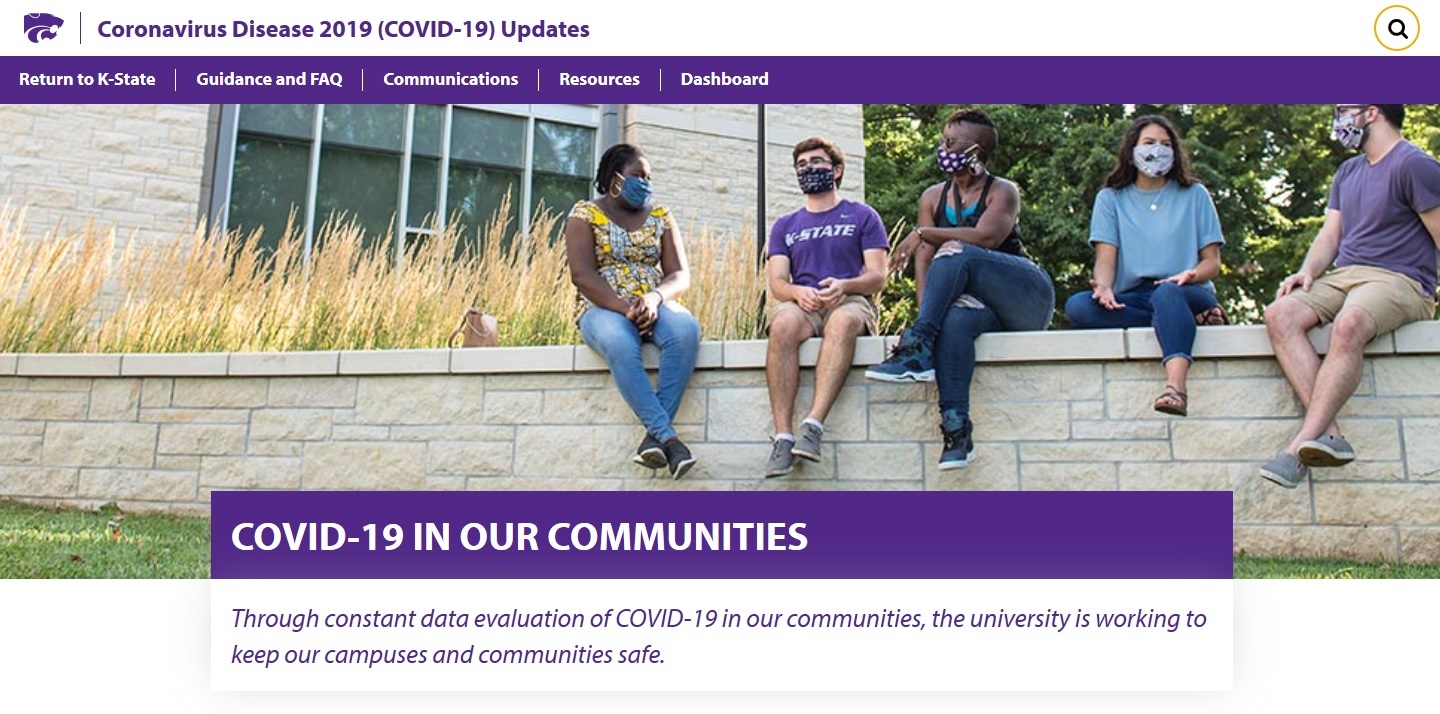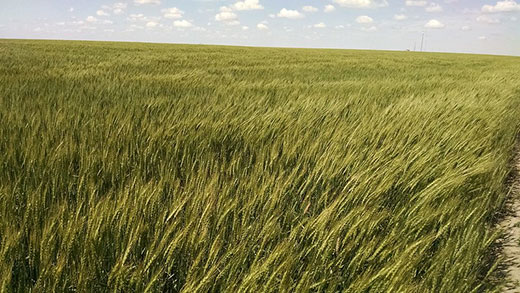08/26/20
K-State Current - August 26, 2020
K-State Current is a weekly news update for the Kansas Board of Regents to apprise the Regents on a few of the many successes and achievements made by K-State faculty, staff and students.
K-State News
K-State launches online dashboard to track COVID-19 data
 Kansas State University is working to keep our campuses and communities safe by constantly evaluating COVID-19 data and making that data publicly available.
Kansas State University is working to keep our campuses and communities safe by constantly evaluating COVID-19 data and making that data publicly available.
K-State has launched an online dashboard that tracks COVID-19 data in university-connected communities. The dashboard will be updated every Wednesday and will include the previous week's data, including on-campus testing data from Lafene Health Center, the number of students in quarantine and isolation, and data on instructional modes.
The Return to K-State section of the COVID-19 website now also includes information about the key indicators that determine the university's operational status and includes other valuable community and state resources. For a more complete picture of the COVID-19 situation in our campus host communities, visit websites from the Riley County Health Department, the Saline County Health Department and the Johnson County Health Department.
Learn more and view the dashboard at k-state.edu/covid-19/communities.
K-State Faculty Highlights
Computer science professor to head NSF-funded open science grid expansion across Great Plains
 Daniel Andresen, director of the Institute for Computational Research in Engineering and Science and computer science professor in the Carl R. Ice College of Engineering at Kansas State University, has been awarded more than $350,000 from the National Science Foundation to lead a project in support of computational and data-intensive research across the region.
Daniel Andresen, director of the Institute for Computational Research in Engineering and Science and computer science professor in the Carl R. Ice College of Engineering at Kansas State University, has been awarded more than $350,000 from the National Science Foundation to lead a project in support of computational and data-intensive research across the region.
The three-year effort, "The Great Plains Augmented Regional Gateway to the Open Science Grid," is sponsored by the NSF's Office of Advanced Cyberinfrastructure and will create a regional, distributed Open Science Grid Gateway led by the Great Plains Network. Collaborators include Pratul Agarwal, Oklahoma State University; Timothy Middelkoop, University of Missouri, Columbia; Stephen Wheat, Oral Roberts University; and Ryan Johnson, University of South Dakota.
The proposal is designed to accelerate the adoption and experience of advanced high-throughput computing and data resources by developing a model for enhanced distributed computational systems.
"This project will multiply the number of open science grid sites in the Great Plains Network region by a factor of eight, adding at least 2,048 cores dedicated to open science grid use and providing potential access to more than 42,000 additional existing cores at participating institutions," Andresen said.
Adding these core sites at university research centers across the Great Plains is designed to accomplish the following key objectives: improve campus awareness and adoption of advanced, high throughput computer-oriented operations for STEM research and education activities; increase the number and capabilities of campus research computing and data professionals; and enable deployment and operation of research and education cyberinfrastructure to make science more efficient, trusted and reproducible.
"This funded work will help drive K-State's research and education goals forward by deepening ties with more than a dozen regional institutions," Andresen said, "in turn adding to our ability to support research and education on a regional scale and extend the K-State family to include hundreds of students and faculty."
The Great Plains Network connects universities and state networks throughout the Midwest and Great Plains. The network has 22 full members, including K-State, the University of Kansas and Wichita State University, as well as affiliate members from across the region.
K-State teams with Canadian university to apply gene editing technology for improving wheat
 Kansas State University officials say a $650,000 grant from the USDA”s National Institute of Food and Agriculture has spurred a partnership with a Canadian university to improve wheat using genome editing technology.
Kansas State University officials say a $650,000 grant from the USDA”s National Institute of Food and Agriculture has spurred a partnership with a Canadian university to improve wheat using genome editing technology.
Eduard Akhunov, a wheat geneticist who will lead K-State’s work on this project in collaboration with colleague Harold Trick's research team, said the university will join with researchers at the University of Saskatchewan in using genome editing technology to improve productivity and nutrition in the world’s wheat lines.
Genome editing, he said, relies on a technology called clustered regularly interspaced short palindromic repeats – better known by its abbreviation, CRISPR.
“CRISPR is a powerful and extremely precise molecular tool capable of making targeted changes in genetic code,” Akhunov said. “It allows us to produce novel variants of genes that have improved properties and create a positive impact on the traits of interest.”
Using genome editing to target genes that are linked to valuable agronomic traits allows researchers to accelerate the development of crops that produce higher yields, are more nutritious or yield higher quality grain.
“Our project will use the capabilities of CRISPR-Cas (referring to use of the technology with an associated protein) to empower traditional breeding strategies,” Akhunov said. “Integrating this tool into modern breeding practices can substantially speed up the rate of genetic gain by accelerating the identification of agronomic genes, broadening genetic diversity, and reducing the time required for traits introgression (transfer) into the adapted germplasm.”
Curtis Pozniak, director of the Crop Development Centre at the University of Saskatchewan, leads his university’s work. Together, the research groups will use CRISPR to introduce domesticated traits into wild wheat relatives. “These efforts may pave new ways for broadening the genetic diversity of modern bread wheat by creating newly domesticated varieties of wild crops,” Akhunov said.
“Our combined efforts should help to establish the CRISPR-Cas technology as a precision breeding tool in the wheat breeder’s toolbox for characterizing, developing and transferring traits into their breeding programs.”
Akhunov’s research team at K-State has previously used CRISPR-based genome editing to create novel variants of genes and develop wheat lines with increased grain size and weight, and number of grains per head.
He said the new project also will test a new strategy to create novel trait variation by mutating a region of the wheat genome that is responsible for regulating genes tied to nitrogen uptake, carbon fixation, growth and nutrient remobilization.
“Currently, there is limited understanding of the range of possible variation for these traits that can be generated by editing these regulatory regions of genes,” Akhunov said.
The project will collaborate closely with NIFA’s Wheat Coordinated Agriculture Project (Wheat-CAP), a multi-state project; the International Wheat Yield Partnership; and the NIFA IWYP Winter Wheat Breeding Innovation Hub, which was recently established at K-State.
K-State Student Highlights
Architectural engineering students awarded national scholarships
 Seven Kansas State University architectural engineering students have been named recipients of undergraduate scholarship totaling $28,500 from the Besal Lighting Education Fund. These numbers represent seven of the 13 national scholarships awarded and 30% of the total dollars.
Seven Kansas State University architectural engineering students have been named recipients of undergraduate scholarship totaling $28,500 from the Besal Lighting Education Fund. These numbers represent seven of the 13 national scholarships awarded and 30% of the total dollars.
Awardees are Saadia Cleve, McKenna Holdsworth, Joe Levin, Kaitlan Muzingo, Gabriella Radina, Catelyn Rees and Stacia Satzler.
Since 2013 K-State architectural engineering students have received $70,000 in scholarships from this fund. Nationally, the Besal Fund awarded a total of 20 undergraduate and graduate scholarships for the upcoming school year to deserving students with an interest in lighting design and the lighting industry in general.
"We are extremely proud of the track record of our students in this well-respected academic endeavor," said Fred Hasler, professor and John W. and Dorothy M. Burke architectural engineering chair, as well as K-State's Besal Fund liaison and supervisor of lighting-related courses in the department.
The fund was established in the honor of the late Robert J. Besal, whose career of more than 30 years in the lighting industry exemplified the high standards of knowledge, professionalism and service the Besal Fund aspires to encourage in today’s students. It was created to provide a continuing program to improve lighting education in illuminating engineering and to find and recognize top lighting students and encourage their pursuit of lighting industry careers.
Scholarships for undergraduate and graduate students through the Besal Fund are available only to those who attend a qualified Besal campus. Kansas State University, and the GE Johnson Department of Architectural Engineering and Construction Science Department, are one of only six universities in the U.S. who are qualified because of the extensive offering of course work related to lighting and lighting systems design.
K-State financial planning team among finalists for national competition
 Three students in the personal financial planning department, College of Health and Human Sciences, have continued the tradition of K-State financial planning competition teams making the finals for the Financial Planning Challenge hosted each year by the Financial Planning Association. K-State has now made the finals in 19 of the 20 years the competition has been held, placing in the top-three 13 times.
Three students in the personal financial planning department, College of Health and Human Sciences, have continued the tradition of K-State financial planning competition teams making the finals for the Financial Planning Challenge hosted each year by the Financial Planning Association. K-State has now made the finals in 19 of the 20 years the competition has been held, placing in the top-three 13 times.
This year’s team is comprised of seniors Garrett Jackson, Cedar Point; Delaney Johnson, Lindsborg and Claire Herrmann, Olathe.
“We are so proud of Claire, Delaney, and Garret. We look forward to them representing K-State’s long history of excellence on the national stage, ”said department head Martin Seay.
The team will compete in the final competition during the Financial Planning Association’s annual conference, scheduled for the end of September. As finalists, the team will receive roundtrip transportation, lodging, a $75 gift card, complimentary conference registration, a 1-year membership to the Financial Planning Association, and professional hours towards the experience requirement leading to certification. Should the team place in the top-three of the final competition, they can win up to $10,000 scholarship for the personal financial planning department.
K-State's personal financial planning department strives to be world known for its research, education, service and outreach in financial planning offering emphasis in financial counseling and financial therapy. The program has been consistently ranked as one of the top five undergraduate programs in the country. The department also offers master's and doctoral degrees as well as several professional certificates.
The Financial Planning Association (FPA®) is the premier professional organization for Certified Financial Planner (CFP®) professionals, educators, financial services providers and students who seek advancement in a growing, dynamic profession.